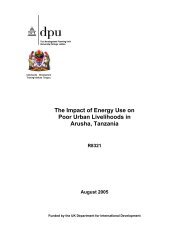EPA Review Annex Documents - DFID
EPA Review Annex Documents - DFID
EPA Review Annex Documents - DFID
You also want an ePaper? Increase the reach of your titles
YUMPU automatically turns print PDFs into web optimized ePapers that Google loves.
the need for deliberation on regional integration issues arises either from within the ministry,<br />
from the ECOWAS Commission or from problems associated with the implementation of some<br />
of the ECOWAS protocols. Thus, when Ghana released a legislation that increased the capital<br />
base of trading enterprises in which many Nigerians in Ghana are engaged, there was a need<br />
for inter-ministerial meetings between the then Federal Ministry of Commerce, Foreign Affairs,<br />
and the Nigeria Investment Promotion Commission. Activities of the bilateral agreement team<br />
are stepped up from mostly political pronunciations of stronger socio-political and economic<br />
bonds between Nigeria and other countries or visitations between Nigerian and foreign<br />
governments, which are composed of meetings to identify areas of mutual interest that often<br />
culminate into signing of memoranda of understanding (MOUs).<br />
Table 1 Structure of Nigeria’s Department of Trade and Staffing<br />
S/N Section Number of staff Number in Abuja Share of<br />
Total<br />
1 Director’s Office 5 100<br />
2.3<br />
2 Bilateral 14 100 6.5<br />
3 Multilateral 9 100 4.1<br />
Intra-Africa 8 100 3.7<br />
4<br />
UNCTAD 7 100 3.2<br />
5<br />
World Trade<br />
28<br />
6<br />
Organisation<br />
a 78.6 12.9<br />
7 Trade Promotion 43 100 19.8<br />
8 TIC&P 3 100 1.4<br />
Weights and<br />
91 17.6 41.9<br />
9<br />
Measures<br />
10 SCUML 9 100 4.1<br />
217 100<br />
Source: Federal Ministry of Commerce and Industry, Abuja, 2009; ‘a’ includes six staff at the WTO office:<br />
1 Ambassador, 3 Counsellors, 1 Accountant and 1 Secretary.<br />
The <strong>EPA</strong> negotiating team features two additional committees that the others do not have.<br />
These are the Ministerial Advisory Committee and the Technical Committee on <strong>EPA</strong>. The<br />
Technical Committee on the <strong>EPA</strong> (see composition on Table 2) ideally meets once a month,<br />
however in some cases will not meet for up to three months because in some cases the<br />
committee’s meetings are funded in by the <strong>DFID</strong>. In the ENFP is an <strong>EPA</strong> sub-committee which<br />
should perform the functions of the Ministerial Advisory Committee and the Technical<br />
Committee on <strong>EPA</strong> but for the fact that the ENFP hardly ever convenes meetings. Indeed, it is<br />
because the ENFP can be regarded as moribund that the advisory and technical committees<br />
were created to fill the advisory and technical vacuum in the case of the <strong>EPA</strong>; this need was<br />
also induced by the intensity of discussion required. The ad-hoc inter-ministerial committees are<br />
undeniably also more active in the case of the other negotiating areas. Unfortunately, with the<br />
quantum of preparations required to negotiate the <strong>EPA</strong>, only 3.3% of the staff of the Department<br />
of Trade are in the Intra-Africa section which negotiates the <strong>EPA</strong> (Table 1). In totality, despite<br />
the inadequacy of staff at the Ministry, the <strong>EPA</strong> negotiating structure appears to be the most<br />
visible and active. Many reasons explain the high level of activities of the <strong>EPA</strong> negotiating team<br />
123
















